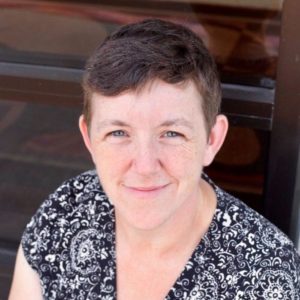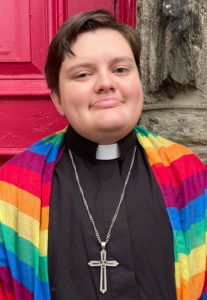|
|

|
|
|
|
|
|||||
|
|||||
|
|
|
|
We were a number of months into the pandemic when a clip of a late-night show caught my eye. “You have to see this!” my feeds echoed. Scraping the bottom of the well of all my reserves that were being used up keeping our queer little family safe and alive in a time of global pandemic and racial justice reawakening while also starting a new job I wearily clicked through looking for a moment of distraction or levity. And then I watched as Alanis Morrisette relived every meeting I had been trying to have over Zoom for the last months on national late night television—holding her small child she performed her song “Ablaze” being interrupted to have to explain what she was doing, having her equipment tugged at, and still delivering a powerful performance. The delivery of the song was enough to win me over and give me a moment of feeling seen but the song itself is what has kept it on my playlist for these many months that have followed. You see, the song is an oath to her children. It sings to them lifting up that which makes them uniquely glorious and says “I see you; I love you” and it is a naming of the commitment as their parent to keep the fire in their eye ablaze.
This song speaks to me, particularly as a queer mom of a young child. It’s a reminder that even in these times and with so much out of my control it is my duty to this precious human being to kindle the light in her eyes. To help her understand her inherent worth and dignity and to kindle a flame within her that sees and fights for the recognition of that same worth and dignity in others.
But this is not just a song about parenting. Moving through this month of pride and having just celebrated Pentecost what better time to be reminded that we are called into community through God’s love with the express responsibility to keep the fire in each other’s eyes ablaze. Ablaze with the promise that we are all made in the image of God, imago Dei, and beloved of God. Ablaze with the promise that the unique gifts and stories of our lives are welcome and necessary here in this time and place. Ablaze with a fire to continue to be a part of the difficult and essential work of dismantling White supremacy culture within our church and our world. Ablaze with the fire and promise of righteous anger on which pride began. Ablaze with the audacious hope that all might flourish.
 Dr. Melissa James (she/her) is a Minister of Word and Service (Deacon) in the Evangelical Lutheran Church of America (ELCA). She currently serves the Unitarian Universalist Association as a congregational consultant for the Pacific Western Region and teaches at the University of San Diego in Sociology and Gender Studies. She lives in La Mesa, CA with her wife and 4-year-old daughter.
Dr. Melissa James (she/her) is a Minister of Word and Service (Deacon) in the Evangelical Lutheran Church of America (ELCA). She currently serves the Unitarian Universalist Association as a congregational consultant for the Pacific Western Region and teaches at the University of San Diego in Sociology and Gender Studies. She lives in La Mesa, CA with her wife and 4-year-old daughter.
________ Pride
It’s hard to qualify Pride this year. The symbolic void where an impulsive “happy” should go weighs heavily on me today.
I would love to go with our usual greeting. “Happy Pride!” I want to scream Happy Pride from the rooftops and platforms -virtual or otherwise- and assure every single person in our community that this is the month when we can let our colors fly and we can show up as we are, even for a day, a moment, under the sun.
However, the realities we live in political, ecclesial, and socioeconomic, bluntly point back to that void where the “happy” should be.
Pride.
We all encounter Pride in different ways, in different spaces, and in different times as we grow, live, love, age, come out, come together, grow apart, move on, and stay. We find Pride in the quiet affirmations of chosen family keeping us safe, and by ourselves in our closets, in the whispers of promises that things will get better.
We find Pride in pool parties and harnesses, haircuts, nail polish, brunch, church, dungeons, and homes. We find Pride in the multitude of our talents and gifts. In our galaxy of genders. In the multiplicity of our love, care, and attractions.
I find Pride in the embrace of our community and identities, hopes, goals, and dreams. However, I can’t say that this is exactly happy.
Many of us still struggle with representation, care, and community. Many of us struggle living a public life, free from fear of harassment and harm. Hell, many of us struggle just staying alive.
Pride.
Beloved child of God, I invite you to meditate on what Pride means for you today. How would you qualify Pride?
Throughout the history of our faith, we can see this impulse to collectively qualify figures and events to speak to a hegemonic majority in the best of cases, or at our worst, to actively oppress, marginalize, and exterminate the cultural, ethnic, and religious other.
Yet here we are. Queer, trans, bi, sapphic, Aro/Ace Christians. Poly, kinky, vanilla, Lutherans.
We understand how our faith confession can be both liberating and condemning. We live, and live into this ambiguity, this queerness if you may, every day.
I would struggle to call it one thing, let alone good, facing all the evidence of what has been done in the name of Christ and the church.
Yet here we are.
Confessing and believing that the composer of creation wrote us, specifically us, as part of the symphony of the cosmos.
I believe that this is the case for our community too. We are not here as an accident or by chance, but by choice. We are all, in our difference and diversity, part of this community to make it whole, beautiful and powerful. Like Esther, we were called for such a time as this.
ELM community, this is a hard, complicated, messy time, and even though we can’t all claim “happy”, I hope and pray that we can definitely claim our Pride.
Subversive, chaotic, powerful, and confessional.
Embodied as it is. As you are.
We make Pride what it needs to be, and what we pray it will become. So today as June starts my prayer is that you can claim the Pride you need. That you can find your co-conspirators and your strength in our communities. That you rage and meditate and share the Pride that is, knowing that the Pride we all make will be even better.
So beloved, I wish you a Pride. Make of it what you must. We trust that the God who was with our queer elders though history will keep showing us the way towards happiness, but more importantly, towards justice.
Because I’m a church nerd, I decided to pick a hymn that gives my little queer heart life, “Come, Join the Dance of Trinity”. Let me preface this by saying that I can’t dance. I’ve seen toddlers with better moves than me. But the concept of dance, the uninhibited celebration of expression and emotions, is what draws me to this hymn.
The idea of the Trinity dancing, of making a space for us formed out of love and hope, is something that especially resonates for me as a queer person. Love of God’s children, and hope in their potential, is what this queer nerd needs. And this dance is meant for us.
Much like the toddler I mentioned earlier, nothing can stop the dancing. And, as this hymn points out, not even death can stop the dance. The love, hope, the very potential of all of us is not only accepted by God but is encouraged and sustained by God.
I’ve faced situations when being queer and being a leader in the church seem antithetical, where it feels like there’s a lot of “weight and woe”; the last thing I feel like doing is dancing (even if I could).
I feel like telling the world what it can do with its opinion of me, and it’s usually not that “we are free to move”. But this reminder that we are fearfully and wonderfully made, that no person, thing, or organization has the right to restrict our joy, gives my queer self a little boost. As if this isn’t good enough, we are invited to participate in God’s creation, to shape our lives and to shape joy. How could we ever shape joy on our own? And what love God must have to dance with us, love us, nurture our joys and our passions, and claim us as God’s own children!
Amen.
 Cari States-Codding (Pronouns: any, if used respectfully) is a third-year seminarian, preparing for their capstone internship. Cari and their husband live with their two fur gremlins, Archie and Thor, and their three-member support staff has helped give them life throughout seminary.
Cari States-Codding (Pronouns: any, if used respectfully) is a third-year seminarian, preparing for their capstone internship. Cari and their husband live with their two fur gremlins, Archie and Thor, and their three-member support staff has helped give them life throughout seminary.